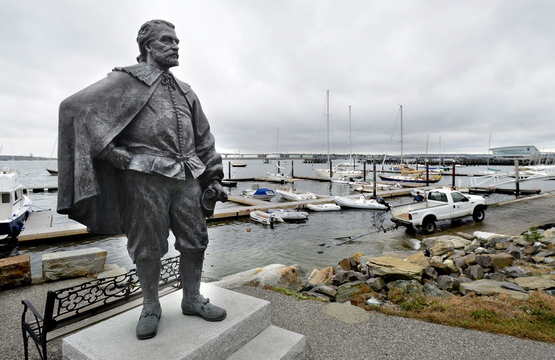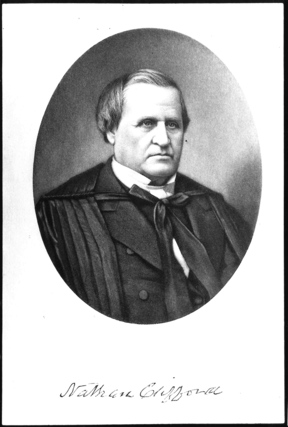Nathan Clifford of Portland was a U.S. Supreme Court justice in the mid-1800s who didn’t believe the federal government should meddle with states that supported slavery.
Last month, the City Council designated the former Nathan Clifford Elementary School on Falmouth Street as a local landmark and is trying to get it listed on the National Register of Historic Places.
Clifford’s views on slavery were raised during the Sept. 16 meeting, but dismissed by City Councilor Edward Suslovic, who represents the district. Suslovic said council action is designed so a project to redevelop the former school into market-rate housing can receive federal tax subsidies.
“To me, the historic designation does not reflect Justice Clifford’s views on slavery,” Suslovic said.
That attitude is a far cry from the city’s treatment of George Cleeve, who is considered the founder of Portland.
About a decade ago, city officials refused to accept a statue of Cleeve because he was rumored to have owned a “colored servant” when he and his business partner Richard Tucker arrived on the peninsula in 1633. The accusation was first raised in a history of Cape Elizabeth written in 1965.
The council’s rejection of the statue came even though no proof existed that Cleeve ever owned a slave. In fact, Cleeve descendants presented evidence to the council that the servant, Oliver Weekes, was a sailor hired to assist Cleeve’s settlement in Portland.
The row continued the following year when the city refused to allow the Amistad replica ship to dock at Portland Yacht Services, where the 7-foot bronze statue of Cleeve now stands near the water’s edge behind a chain-link fence. The Amistad was a 19th-century tall ship that was taken over by slaves and depicted in a movie of the same name.
The apparent double standard highlights the long shadow that slavery continues to cast over the city, in some ways.
And Clifford and Cleeve are not the only prominent figures in Portland history to have such skeletons in their closet.
While many abolitionists called Portland home – including William Fessenden (a U.S. representative and senator in the 1840s and 1850s, and President Lincoln’s Treasury secretary in 1864 and 1865) – and the city is home to the Abyssinian meeting house (built by free African Americans in 1828), many people were torn over the issue of slavery.
In many ways, Maine’s economic dependence on the South split the state over the slavery issue.
Portland was a robust maritime port in the mid-1800s. In addition to sugar cane, vessels delivered cotton from the South to feed the state’s textile industry.
Although many Mainers believed slavery was morally wrong, their economic interests were reliant upon industries that used slave labor.
“(Mainers were) caught in a dilemma between whether they want to support the union and the abolition of slavery versus their own incomes,” State Historian Earle Shettleworth Jr. said. “This is a very complex period in American history.”
During the 1800s, Maine – and Portland in particular – were an important cog in the so-called Trade Triangle.
Sugar cane from the South was shipped to Portland, where it was made into white granulated sugar and molasses on the city’s waterfront, which at one point imported three times as much sugar cane as Boston.
That molasses was then used to make rum, which in turn was used by human traffickers to acquire slaves, according to local historian Herb Adams.
“Maine was intimately connected to” the Trade Triangle, Adams said.
Such was the case with Nathaniel Gordon, a Portland native who has the distinction of being the only American to be tried, convicted and executed for trading slaves.
Gordon, who lived on Danforth Street, was captain of the slave ship Erie. He made three successful slave voyages before being caught by the U.S. steamer Mohican in 1860. Gordon, who had just traded vats of rum and whiskey for 900 slaves, was brought back to New York to stand trial. He was convicted in 1861.
Human trafficking was declared an act of piracy in 1820 that carried a punishment of death. However, it was unusual for slave traders to be prosecuted, let alone receive capital punishment for their crime.
The newly elected president, Abraham Lincoln, was eager to make an example out of Gordon, by hanging him in public.
According to an eyewitness account published in the Portland Daily Advertiser in 1862, Gordon, 28, took strychnine the night before his execution, but a doctor resuscitated him so he could be hanged on a gallows that, through a system of ropes and pulleys, lifts the prisoner 4 feet off the ground.
“Gordon was then led to the gallows, the rope adjusted, the black cap drawn over his face and he was launched off into eternity,” the author wrote.
“This is a great triumph,” the author continued. “It will strike terror which nothing else could into the hearts of traffickers of human flesh.”
Clifford, who never owned slaves or advocated for slavery, served as a Maine legislator in 1830 and speaker of the House in 1833, before becoming the state’s attorney general in 1834. He went on to serve two terms in the U.S. House of Representatives starting in 1838 and as the U.S. attorney general under President James K. Polk in 1846.
While on the Supreme Court, however, Clifford often voted with the majority of justices in favor of a strict interpretation of the 13th, 14th and 15th amendments to the U.S. Constitution, which abolished slavery and guaranteed former slaves with equal protections and rights – including the right to vote – as whites.
Clifford believed the amendments applied only to the federal government and didn’t extend to states, groups or individuals, Adams said.
His nomination to the Supreme Court was controversial in 1857. He was confirmed by the U.S. Senate in 1858 by a thin margin of three votes – 26-23 – and died a justice in 1881.
“(Clifford) was damned as a Southern Sympathizer, about the most abusive epithet any northern political figure could be tagged with in those heated times,” according to an April, 12, 1970, article in the Maine Sunday Telegram.
In 1859, Clifford voted to uphold the fugitive slave laws, which required escaped slaves to be returned to their masters. In 1873, he voted in support of a strict interpretation of the 14th Amendment, which gave slaves equal rights. And in 1877, he voted twice to restrict the federal government’s enforcement of black voting rights.
“He did not support slavery and he opposed Southern (secession),” Shettleworth said. “He took a very strict constructionist view of the Constitution and would sometimes rule in such a way that appeared as though he was favoring those positions.”
Randy Billings can be contacted at 791-6346 or at:
Twitter: @randybillings
Send questions/comments to the editors.





Success. Please wait for the page to reload. If the page does not reload within 5 seconds, please refresh the page.
Enter your email and password to access comments.
Hi, to comment on stories you must . This profile is in addition to your subscription and website login.
Already have a commenting profile? .
Invalid username/password.
Please check your email to confirm and complete your registration.
Only subscribers are eligible to post comments. Please subscribe or login first for digital access. Here’s why.
Use the form below to reset your password. When you've submitted your account email, we will send an email with a reset code.